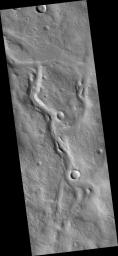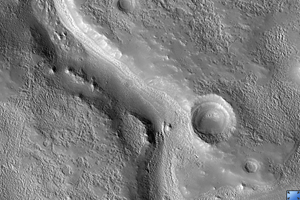
|
Valleys on the Ejecta Blanket from Cerulli Crater
- Click the image above for a larger view
- Full-Res JPEG (2048 x 4450) (1.3 MB)
- Full-Res TIFF (2048 x 4450) (9.1 MB)
Caption:

Click on image for larger version
HiRISE image ( PSP_003312_2145 ) reveals valleys that cross the ejecta from the large impact crater Cerulli to the south.
The valleys appear to have been cut by flowing water and then buried by later deposits of unknown origin, possibly carried in by the wind. While it is clear that the valleys are younger than the ejecta and older than at least some of the mantling materials, the exact time they were formed is uncertain.
For example, it is possible that the valleys were carved immediately after Cerulli crater formed, as has been inferred for some other valleys around craters imaged elsewhere on Mars by HiRISE. Alternatively, the valleys may have formed some time after the crater formed, perhaps as a result of water released from an earlier mantling deposit.
A second image is planned for this area and will yield three-dimensional information from stereo that may help to resolve the timing and source of water responsible for carving the valleys.
Observation Toolbox
Acquisition date:
4 April 2007
Local Mars time:
3:27 PM
Degrees latitude (centered):
34.0°
Degrees longitude (East):
21.8°
Range to target site:
293.0 km (183.2 miles)
Original image scale range:
29.3 cm/pixel (with 1 x 1 binning) so objects ~88 cm across are resolved
Map-projected scale:
25 cm/pixel and north is up
Map-projection:
EQUIRECTANGULAR
Emission angle:
3.6°
Phase angle:
72.8°
Solar incidence angle:
70°, with the Sun about 20° above the horizon
Solar longitude:
217.1°, Northern Autumn
Background Info:
NASA's Jet Propulsion Laboratory, a division of the California Institute of Technology in Pasadena, manages the Mars Reconnaissance Orbiter for NASA's Science Mission Directorate, Washington. Lockheed Martin Space Systems, Denver, is the prime contractor for the project and built the spacecraft. The High Resolution Imaging Science Experiment is operated by the University of Arizona, Tucson, and the instrument was built by Ball Aerospace and Technology Corp., Boulder, Colo.
Cataloging Keywords:
| Name | Value | Additional Values |
|---|---|---|
| Target | Mars | |
| System | ||
| Target Type | Planet | |
| Mission | Mars Reconnaissance Orbiter (MRO) | |
| Instrument Host | Mars Reconnaissance Orbiter | |
| Host Type | Orbiter | |
| Instrument | High Resolution Imaging Science Experiment (HiRISE) | |
| Detector | ||
| Extra Keywords | Crater, Grayscale, Impact, Infrared, Map, Water | |
| Acquisition Date | ||
| Release Date | 2007-05-02 | |
| Date in Caption | 2007-04-04 | |
| Image Credit | NASA/JPL/Univ. of Arizona | |
| Source | photojournal.jpl.nasa.gov/catalog/PIA09675 | |
| Identifier | PIA09675 | |
